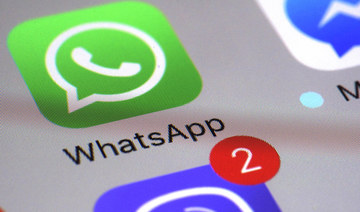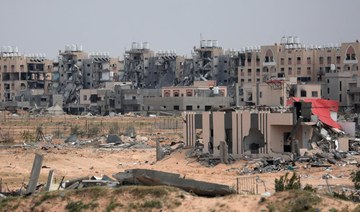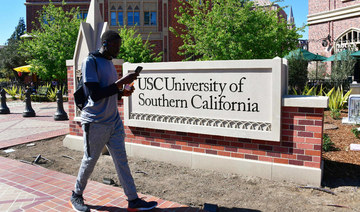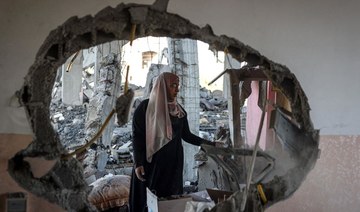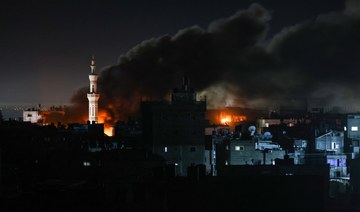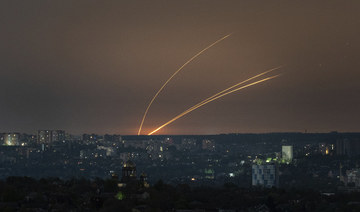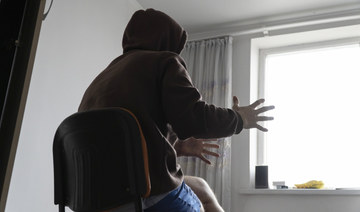NEW DELHI/MUMBAI: WhatsApp clones and software tools that cost as little as $14 are helping Indian digital marketers and political activists bypass anti-spam restrictions set up by the world’s most popular messaging app, Reuters has found.
The activities highlight the challenges WhatsApp, which is owned by Facebook Inc, faces in preventing abuse in India, its biggest market with more than 200 million users.
With fervent campaigning in India’s staggered general election, which concludes on May 19, the demand for such tools has surged, according to digital companies and sources in the ruling Bharatiya Janata Party (BJP) and its main rival, the Congress party.
After false messages on WhatsApp last year sparked mob lynchings in India, the company restricted forwarding of a message to only five users. The software tools appear to overcome those restrictions, allowing users to reach thousands of people at once.
Divya Spandana, the social media chief of the Congress, and the BJP’s IT head, Amit Malviya, did not respond requests for comment.
Rohitash Repswal, who owns a digital marketing business in a cramped, residential neighborhood of New Delhi, said he ran a 1,000 rupee ($14) piece of software round-the-clock in recent months to send up to 100,000 WhatsApp messages a day for two BJP members.
“Whatever WhatsApp does, there’s a workaround,” Repswal said during an interview at his small, two-bedroom house.
Reuters found WhatsApp was misused in at least three ways in India for political campaigning: free clone apps available online were used by some BJP and Congress workers to manually forward messages on a mass basis; software tools which allow users to automate delivery of WhatsApp messages; and some firms offering political workers the chance to go onto a website and send bulk WhatsApp messages from anonymous numbers.
At least three software tools were available on Amazon.com’s India website. When purchased by a Reuters reporter, they arrived as compact discs tucked inside thin cardboard casings, with no company branding.
WhatsApp declined a Reuters request to allow testing such tools for reporting this story.
“We are continuing to step up our enforcement against imposter WhatsApp services and take legal action by sending cease and desist letters to hundreds of bulk messaging service providers to help curb abuse,” a spokeswoman said. “We do not want them to operate on our platform and we work to ban them.”
Whatsapp clones
Modified versions of popular apps have become common as technically-savvy hobbyists have long reverse-engineered them. Tools purporting to bypass WhatsApp restrictions are advertised in videos and online forums aimed at users in Indonesia and Nigeria, both of which held major elections this year.
For Indian politicians, WhatsApp, Facebook and Twitter are key campaigning tools to target the country’s near 900 million voters.
Two Congress sources and one BJP source told Reuters their workers used clone apps such as “GBWhatsApp” and “JTWhatsApp,” which allowed them to cut through WhatsApp’s restrictions.
Both apps have a green-color interface that closely resembles WhatsApp and can be downloaded for free from dozens of technology blogs. They are not available on Google’s official app store but work on Android phones.
WhatsApp describes such apps as “unofficial” and says its users can face bans, which means the company can block the account associated with a particular mobile number if it detects unusual activity. Some Congress workers said they did not care.
“WhatsApp occasionally bans some of these numbers, but the volunteers would use new (mobile) sim cards to sign up,” said a Congress member with direct knowledge of the activities.
In Mumbai, a person in the social media team of a senior BJP candidate said no restrictions on JTWhatsApp meant his team could easily send forward to up to 6,000 people a day, as well as video files containing political content which would be far bigger in size than allowed on the official WhatsApp service.
Reuters was not able to ascertain the overall scale of such activities and found no evidence that BJP and Congress leaders officially ordered workers to campaign this way.
“Business sender”
In New Delhi, digital marketer Repswal said he would typically charge 150,000 rupees ($2,161) for a month’s service for creating digital content, providing a database of mobile numbers and then sending 300,000 WhatsApp messages.
He uses a piece of software named “Business Sender” which he said he also sells for 1,000 rupees ($14).
A person can add many mobile numbers in a field and compose messages with pictures. Using a so-called “Group Contacts Grabber” feature, the user can also extract a list of mobile numbers from a particular WhatsApp group with a click of a button.
Repswal didn’t name the two BJP members he worked for, but in a demonstration for Reuters, added dozens of mobile numbers in the software, typed a test message saying “your vote is your right” and hit “send.” Then, his WhatsApp web version started delivering the messages almost robotically, one after the other.
Business Sender was “not supported or endorsed” by WhatsApp and was developed by “Tiger Vikram Mysore INDIA,” its system properties said.
A member of the software support team at Business Sender, Rajesh K., declined to identify the developer by his real name, but said the tool was designed in Lebanon about four months ago and takes advantage of what he called a “loophole” in WhatsApp’s system.
“This is not rocket science or fabricated software,” said Rajesh. “There are hundreds of such software available.”
In April, when a Reuters reporter responded to a text message with an “Election Special” offer of sending 100,000 “bulk WhatsApp” messages for 7,999 rupees ($115), he was invited to an office in a dusty industrial area of Noida in northern Uttar Pradesh state.
“How many messages you want to send, tell us: 10,000, 1 million, 2 million,” a representative asked, while showing a black-colored, password-protected website they use for sending bulk WhatsApp messages.
In India election, a $14 software tool helps overcome WhatsApp controls
In India election, a $14 software tool helps overcome WhatsApp controls
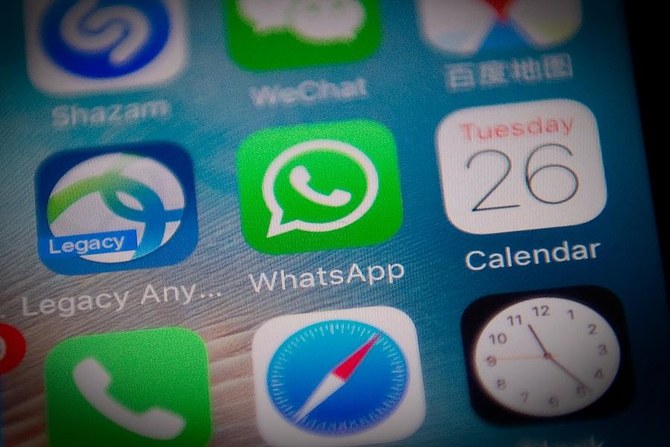
- The activities highlight the challenges WhatsApp faces in preventing abuse in India
- At least three software tools were available on Amazon.com’s India website
Eurovision Song Contest host Sweden braces for anti-Israel protests

- Event organizer European Broadcasting Union has resisted calls for Israel to be excluded due to its war in Gaza
- Contest will take place in Malmo from 7-11 May and is expected to draw 100,000 visitors
MALMO: Sweden said it plans to host a dazzling Eurovision Song Contest, watched by 200 million people worldwide, but visitors face heightened security amid planned protests over Israel’s participation and a new geo-political backdrop since Sweden joined NATO.
The contest, the world’s biggest of its kind, takes place in Malmo from 7-11 May and is expected to draw 100,000 visitors to Sweden’s third-largest city which has a large Muslim population. Organizers plan a special tribute to Swedish pop group ABBA, who won Eurovision 50 years ago this year. The European Broadcasting Union (EBU), which organizes the contest, has resisted calls for Israel to be excluded due to its war in Gaza. Controversy over the conflict has already hit various cultural events across Europe. Much focus is expected to be on Israeli contestant Eden Golan and her song Hurricane, as multiple large pro-Palestinian protests are planned outside the venue in Malmo. Israel was permitted to compete after it agreed to modify the lyrics of its original song “October Rain” which the EBU said made reference to the Oct. 7 Hamas onslaught in Israel.
EBU brands Eurovision a non-political event and insists that the contest is between public service broadcasters, not governments.
Still, it banned Russian in 2022 from Eurovision after several European public broadcasters called for the country to be expelled following its invasion of Ukraine.
Sweden is hosting the annual competition for the seventh time, after Swedish singer Loreen won last year’s competition in Liverpool with her song “Tattoo.”
Ebba Adielsson, executive Eurovision producer from Swedish broadcaster SVT, promised “some smashing shows.” She ruled out an ABBA reunion but said the event would celebrate the group’s 1974 win with their song “Waterloo,” a victory that launched the band onto the international stage.
Swiss contestant Nemo is the favorite to win this year, according to bookmakers, followed by Croatia’s Baby Lasagna, Joost Klein of the Netherlands, and Italy’s Angelina Mango.
’HIGH THREAT-LEVEL’
Visitors from 89 countries expected in Malmo will have to pass through airport-like security checks when entering venues around the city.
“There’s a high threat level combined with a lot of people,” said Per-Erik Ebbestahl, Malmo’s security director.
Organizers face the risk of protests escalating into violence, heightened terror threats in the country, and increased tensions with Russia after Sweden’s NATO membership.
In central Malmo there are official posters for Eurovision but also protest banners replicating the same colorful design, with the word Eurovision replaced by ‘genocide’ and the words: “Israel out of Eurovision or Eurovision out of Malmo.”
Orwa Kadoura, a Palestinian living in Malmo and one of the organizers of the protests, said the Israeli delegation was “here to represent Israel and their government, which is committing acts of genocide right now.”
Israel rejects any accusation of genocide in Gaza during its war against Hamas.
Police say security will be tighter compared with when Sweden last hosted the event in 2016.
“The situation around the world is complex, and also the security for Sweden is different,” said Petra Stenkula, Malmo police chief. “We are ready for anything that can happen.”
Sweden joined NATO in March, two years after Russia’s invasion of Ukraine forced it to rethink its national security policy. Russia has threatened to take unspecified “political and military-technical counter-measures” in response.
Gang crime in Sweden’s biggest cities, including Malmo, has also been a problem for years, fueled by the drug trade.
Eurovision begins on May 7 with the first semifinal, followed by a second semifinal two days later and the final on Sat. May 11.
Sky News report reveals Israel’s involvement in mass grave in Gaza
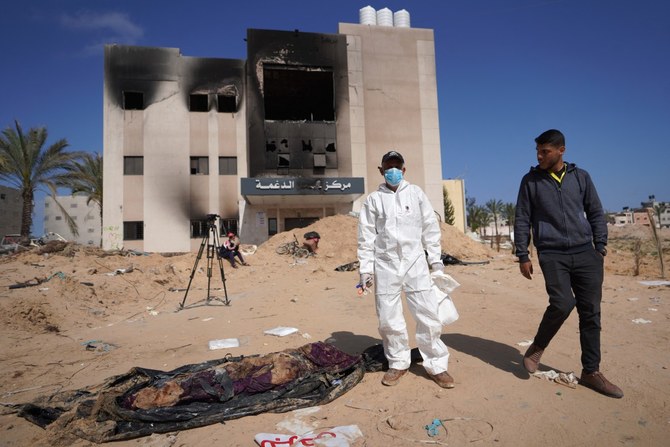
- Evidence suggests IDF bulldozed graves after taking control
LONDON: An investigation by Sky News suggests Israel is likely responsible for the mass grave discovered at a hospital in Gaza’s southern city of Khan Younis over the weekend.
Local authorities reported uncovering 283 bodies in the mass grave within the courtyard of Nasser Hospital after the Israel Defense Forces withdrew from the area on April 7.
Israel’s military dismissed claims of burying bodies there as “baseless” but confirmed that it had “examined” some bodies during a two-week operation at the hospital.
Analysis of satellite imagery and social media indicates that Palestinians buried their dead in mass graves during Israel’s siege of Nasser Hospital and that the IDF bulldozed these graves after taking control.
Prior to the Israeli army’s takeover of the hospital compound in its full-scale operation in February, staff had been forced to bury hundreds of bodies in makeshift graves near the hospital’s main building due to the impossibility of reaching nearby cemeteries.
The IDF began exhuming and examining bodies buried in the compound based on intelligence sources indicating the presence of bodies belonging to Israeli hostages.
The army said the examination “was carried out respectfully while maintaining the dignity of the deceased.
“Bodies examined, which did not belong to Israeli hostages, were returned to their place,” the IDF added.
However, Sky News’ Data and Forensic team discovered evidence indicating extensive damage to the sites caused by the army’s examination.
Footage uploaded a few days after the IDF left Nasser Hospital showed significant destruction at the southeastern corner of the complex, where some of the mass graves had been dug.
Another video revealed that bulldozer operations in the area caused an arm to be visible, partially buried in a mound of earth.
Satellite images confirmed that the damage occurred while Israeli forces were occupying the complex between Feb. 15 and 22.
The UN’s human rights chief expressed horror at the discovery and announced an investigation into claims that some of the bodies had their hands bound and were stripped of clothing.
Earlier last week, other mass graves were found at Al-Shifa, the largest medical facility in the coastal enclave.
The discovery led the Hamas-run government to accuse Israel of digging the graves “to hide its crimes.”
Since the conflict began, with retaliatory acts toward Hamas fighters killing and kidnapping 1,200 Israelis, Tel Aviv has launched a bloody, full-scale operation into the Gaza Strip that has resulted in the deaths of over 34,000 people, mostly women and children.
US police arrest Jadaliyya co-editor Sinan Antoon during pro-Gaza demonstration at New York University
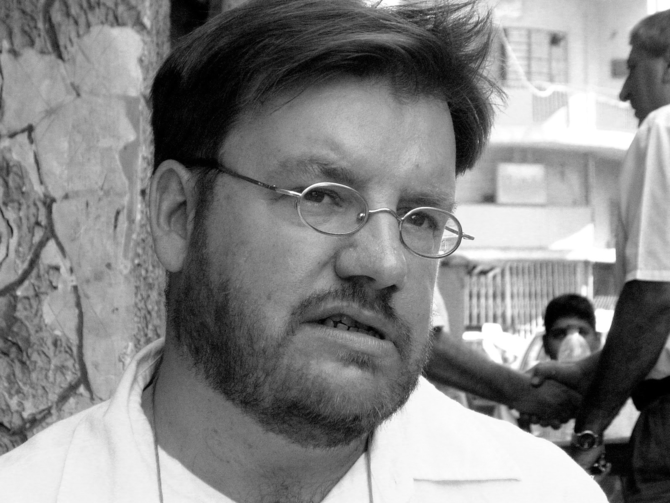
- Antoon was arrested along with other NYU faculty members while attempting to protect demonstrating students from the police
- NYU students were calling for a ceasefire in Palestine's Gaza Strip
LONDON: US police officers on Monday arrested Sinan Antoon, the co-editor of Jadaliyya magazine, during a pro-Gaza demonstration at New York University in Manhattan.
The Arab Studies Institute publication announced in a post on X that Antoon, an associate professor at NYU, was arrested with other faculty members while trying to protect protesting students, who were reportedly calling for a ceasefire in the Gaza Strip.
BREAKING: NYPD arrested Jadaliyya Co-Editor and NYU Associate Professor Sinan Antoon along with other faculty and students as he/they was/were trying to protect NYU students from the Police. We will not ever be silenced.
— Jadaliyya (@jadaliyya) April 23, 2024
Antoon is an Iraqi-American poet, novelist, literary translator and academic. He was born and raised in Baghdad before moving to the US after the 1991 Gulf War.
The Israeli onslaught on the besieged enclave has since Oct. 7 killed at least 34,000 Palestinians, displaced some 1.9 million, and injured more than 75,800 people, according to Gaza’s health authority.
Confirming Jadaliyya’s announcement, human rights attorney Noura Erakat wrote on X: “NYPD is arresting faculty on their campuses for protecting their students.
“The academy is imbricated with the state and the military industry intent on war in blatant abrogation of its mission and any semblance of independence. What a gross betrayal.”
NYPD is arresting faculty on their campuses for protecting their students.
— Noura Erakat (@4noura) April 23, 2024
The academy is imbricated w the state & the military industry intent on war in blatant abrogation of its mission & any semblance of independence. What a gross betrayal. #Gaza #Genocide #Nakba https://t.co/f0tnYhHnNt
On Monday, officers from the New York Police Department moved in on NYU demonstrators after a deadline expired for people to clear an area of the campus, the Financial Times reported.
This came hours after New York’s Columbia University, where more than 100 people were arrested last week, announced it would switch to online classes in an attempt to defuse pro-Palestine protests.
The arrests at the NYU campus are part of a string of US police clampdowns on university students across the country protesting against the war on Gaza.
Local authorities claimed the clampdowns came amid scrutiny over “antisemitism” on US university campuses.
US police also arrested at least 47 pro-Gaza demonstrators at Yale University in New Haven, Connecticut.
The Columbia University clampdown, the first of its kind in three decades, triggered protests on other US campuses, including at Brown University, Berkeley, Princeton, Northwestern, Massachusetts Institute of Technology, and Emerson College in Boston.
In addition to calling for a ceasefire in Gaza, the protesting students also reportedly called for divestment of the university’s funds from companies linked to Israel.
PEN America awards canceled after writers’ boycott over Gaza
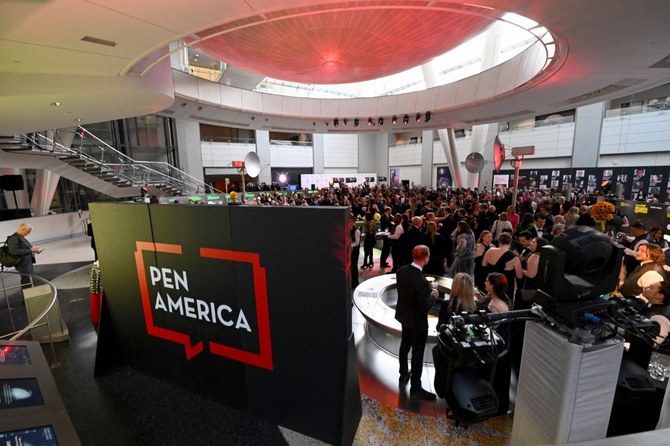
- Almost half of nominated authors withdrew works from consideration
- PEN America accused of complicity in ‘normalizing genocide’ in Gaza
LONDON: PEN America has cancelled its 2024 annual literary awards after several authors boycotted the event over the organization’s perceived failure to take a strong stance against Israel’s war on Gaza.
The decision came in response to an open letter signed by dozens of authors and translators who withdrew their work from consideration for the awards.
Sixty-one authors and translators were nominated but 28 withdrew their work, according to a statement released on Monday, forcing the organization to cancel next week’s event.
“This is a beloved event and an enormous amount of work goes into it, so we all regret this outcome but ultimately concluded it was not possible to carry out a celebration in the way we had hoped and planned,” said CEO Suzanne Nossel.
The boycott emerged amidst growing tensions with PEN, with authors urging the organization to take a stronger stance on the Palestinian crisis and advocate for a Gaza ceasefire.
In the letter, PEN was accused of acting as a “cultural front for American exceptionalism” and complicity in “normalizing genocide” by failing to address the situation in Gaza adequately.
“In the context of Israel’s ongoing war on Gaza, we believe that PEN America has betrayed the organization’s professed commitment to peace and equality for all, and to freedom and security for writers everywhere,” said a separate letter signed last month by several famous writers including Michelle Alexander, Naomi Klein and Zaina Arafat.
PEN America has defended its actions, citing its recent condemnation of the loss of life in Gaza, calls for a ceasefire, and the establishment of a $100,000 emergency fund for Palestinian writers.
The awards, which celebrates voices across various genres including writers of fiction, poetry, children’s literature and drama, was scheduled for April 29 at the Town Hall in New York City.
Russia orders jail term for Meta spokesman in absentia on ‘terrorism’ charges
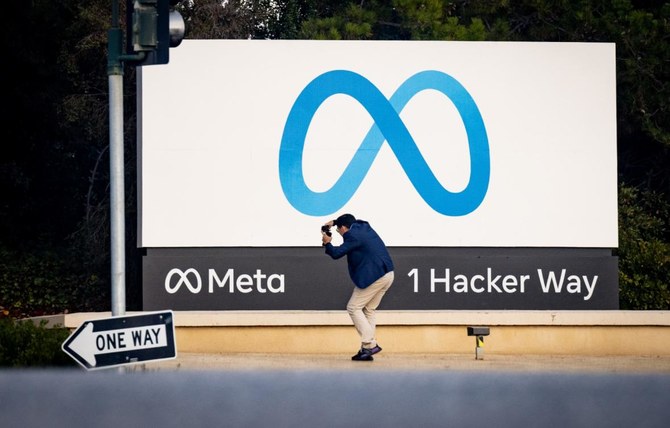
- Andy Stone was sentenced to six years in what has been described as a symbolic ruling agaist Western social media platforms
MOSCOW: A Russian military court on Monday sentenced in absentia Meta spokesman Andy Stone to six years behind bars for “justifying terrorism,” as part of efforts to restrict Western social media platforms in the country.
The largely symbolic ruling came several months after Mosocw, which has blocked Meta platforms Instagram and Facebook, put the US citizen on a wanted list.
Judge Roman Kiforenko said the sentence would begin upon Stone setting foot on Russian territory or being extradited to Russia, news agencies reported.
The case followed a post by Stone in March 2022 — weeks into Moscow’s offensive in Ukraine — in which he said Facebook would not punish users calling for violence against Russian forces.
Stone said Meta had “temporarily made allowances for forms of political expression that would normally violate our rules like violent speech such as ‘death to the Russian invaders.’“
“We still won’t allow credible calls for violence against Russian civilians,” the post read.
Nick Clegg, the President of Meta Global Affairs, said at the time that the policy would only apply “in Ukraine itself.”
Clegg said the decision was taken in “extraordinary and unprecedented circumstances” and was designed to protect “people’s rights to speech as an expression of self-defense.”
Russia barred Meta CEO Mark Zuckerberg from entering the country shortly after launching hostilities in Ukraine.
Moscow does not tolerate criticism of the offensive on social media, imposing fines or jail terms to thousands for denouncing the large-scale military campaign now in its third year.



